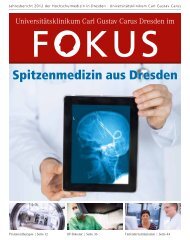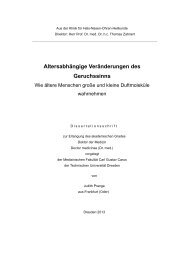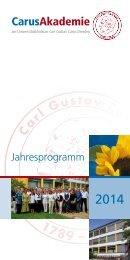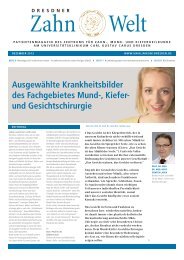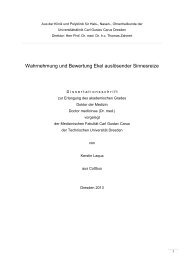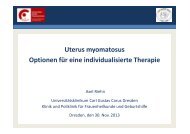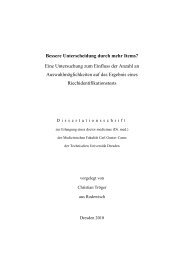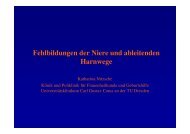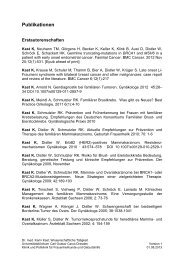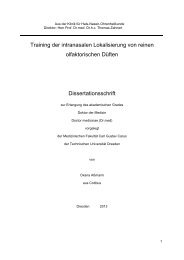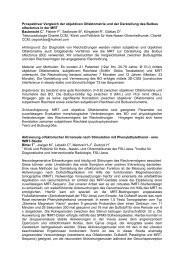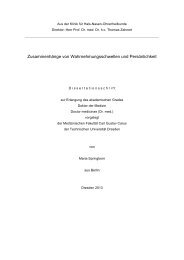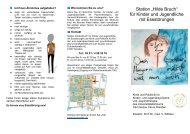Sarah Lehmann 2013 - Universitätsklinikum Carl Gustav Carus
Sarah Lehmann 2013 - Universitätsklinikum Carl Gustav Carus
Sarah Lehmann 2013 - Universitätsklinikum Carl Gustav Carus
Erfolgreiche ePaper selbst erstellen
Machen Sie aus Ihren PDF Publikationen ein blätterbares Flipbook mit unserer einzigartigen Google optimierten e-Paper Software.
Abstract<br />
As a rule, olfactory function decreases in old age. Half of the people aged 65 years and more<br />
show hyposmia. This loss is of multicausal origin and leads to various problems in daily life<br />
which can result in the development of depression. It was analyzed whether the ability to<br />
smell could be improved by repeated, short-term exposure to a specific set of odorants. For<br />
this study on the effects of smell training 104 subjects with an average age of 81 years have<br />
been recruited. Because of dropping out 92 datasets were used for data analysis. Following<br />
a structured, short medical history and exclusion of dementia based on results from the minimental-state-examination,<br />
odor thresholds for phenyl ethyl alcohol and scores in an odor<br />
identification task were determined by Sniffin‘ Sticks before and after the training.<br />
Furthermore participants were requested to evaluate their sense of smell. 43 volunteers<br />
participated in the smell training. The training took three months using four different odors<br />
(rose, lemon, cloves, eucalyptus), that had been selected according to the smell prism<br />
described by Henning. Furthermore the Zerssen mood scale was used to assess the current<br />
mood state on second examination date.<br />
Results indicated that training had tendential effects on odor threshold (p=0,096) while it did<br />
not translate into a major change of odor identification scores. Absolutely improvement,<br />
therefore an increase by 2 or more dilution steps, reached 7,0% of the training group, while<br />
4,7% impaired. For subjects not performing the training these numbers were 6,1% and<br />
14,2%, respectively.<br />
The gender-related consideration showed that only men improved olfactory function by smell<br />
training. Here, the training had significant effects on odor threshold (p=0,023) and tendential<br />
effects on ability of odor identification (p=0,087). The sum of the measured values also<br />
changed significantly (p=0,011).<br />
There was no correlation between the ability to smell and the current mood state.<br />
The self-evaluation correlated significantly with the objective collected data (p=0,016 resp.<br />
p=0,00).<br />
In conclusion, the present data indicates that olfactory training in the elderly may help to<br />
improve aspects of olfactory function. However, this effect needs to be explored further.<br />
V



